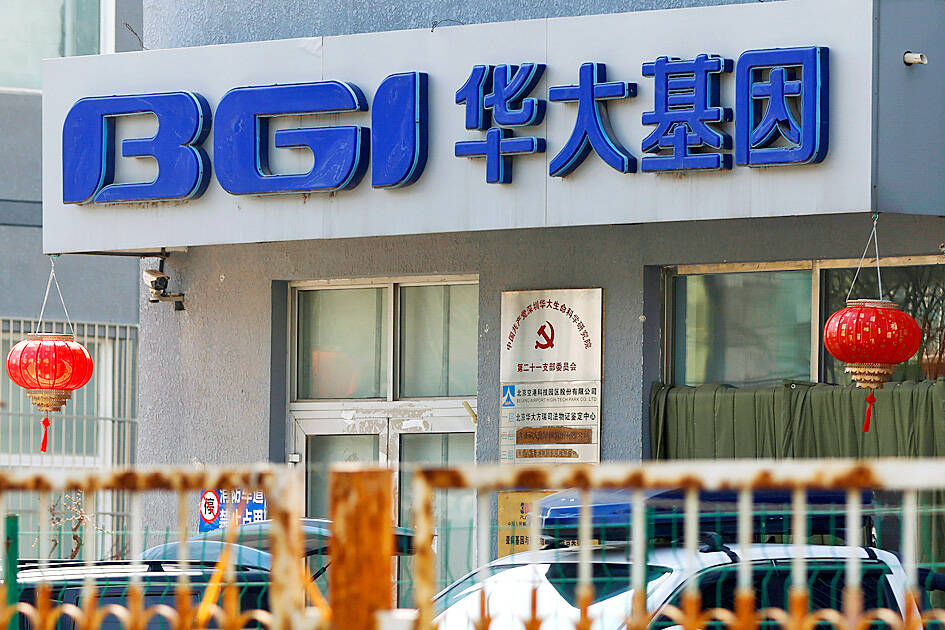Low-cost DNA testing tools from China could present a national security risk, with the potential for genetic data collected in Taiwan to be leaked to China, a cell biologist said yesterday.
The Web site of a local genetic testing company says that it has collaborated with BGI Genomics (華大基因) since 2014, providing its non-invasive fetal trisomy (NIFTY) test in more than 200 obstetrics and gynecology clinics nationwide, including Taipei City Hospital’s Heping Fuyou Branch.
In 2021, Reuters reported that BGI was using the test — one of the most popular in the world — to collect genetic data from millions of women around the globe, and it was sharing that data with the Chinese military for genetic research.

Photo: Reuters
Although BGI said it has never provided data from its NIFTY tests to Chinese authorities for national security or national defense purposes, the NIFTY test has faced scrutiny from regulators in Australia, Canada, Germany and other countries, while the US in March added two subsidiaries of BGI to its trade blacklist.
Academia Sinica Institute of Cellular and Organismic Biology distinguished visiting fellow Wu Jen-leih (吳金洌) said that in addition to BGI, a Beijing-based bioinformatics company, Novogene (諾禾致源), also has laboratories and affiliated agencies in more than a dozen countries, including Taiwan, the US, the UK and Singapore.
The owner of a local genetics company said that the genomic testing and sequencing market in Taiwan can be categorized into four segments, with research and cancer screening accounting for the largest proportion of the market, worth billions of dollars.
Local agents collect specimens from research centers and send most of them to laboratories in China or to the laboratories of subsidiaries of Chinese companies in Southeast Asia for testing, they said.
Some companies have equipment in research centers in Taiwan, which might contain spyware that could send genomic data to China, they said.
Wu said that if genomic data are leaked to China and used for malicious purposes, it could cause a serious national security problem.
He said the government should follow the US in setting up access control systems for genetic data and support the local development of DNA testing tools.
While the US and many European countries developed their own DNA testing and genomic sequencing tools, Taiwan still allows many foreign agents to install equipment made by Chinese companies in hospitals and allows Hong Kong-funded companies to purchase local genetics companies, a genetics company owner said.
The government should support local companies by launching large-scale research projects and banning the use of Chinese equipment, they said.
Department of Medical Affairs Deputy Director-General Liu Yu-ching (劉玉菁) said that the Regulations Governing the Application of Specific Medical Examination Techniques and Medical Devices (特定醫療技術檢查檢驗醫療儀器施行或使用管理辦法) was revised in 2021, requiring hospitals to protect personal data collected through DNA testing.
If laboratories leak genomic data, they could be suspended from running tests, Liu said.
Additional reporting by Wu Liang-yi

Chinese Nationalist Party (KMT) lawmakers have declared they survived recall votes to remove them from office today, although official results are still pending as the vote counting continues. Although final tallies from the Central Election Commission (CEC) are still pending, preliminary results indicate that the recall campaigns against all seven KMT lawmakers have fallen short. As of 6:10 pm, Taichung Legislators Yen Kuan-heng (顏寬恒) and Yang Chiung-ying (楊瓊瓔), Hsinchu County Legislator Lin Szu-ming (林思銘), Nantou County Legislator Ma Wen-chun (馬文君) and New Taipei City Legislator Lo Ming-tsai (羅明才) had all announced they

CHAMPIONS: President Lai congratulated the players’ outstanding performance, cheering them for marking a new milestone in the nation’s baseball history Taiwan on Sunday won their first Little League Baseball World Series (LLBWS) title in 29 years, as Taipei’s Dong Yuan Elementary School defeated a team from Las Vegas 7-0 in the championship game in South Williamsport, Pennsylvania. It was Taiwan’s first championship in the annual tournament since 1996, ending a nearly three-decade drought. “It has been a very long time ... and we finally made it,” Taiwan manager Lai Min-nan (賴敏男) said after the game. Lai said he last managed a Dong Yuan team in at the South Williamsport in 2015, when they were eliminated after four games. “There is

Nvidia Corp CEO Jensen Huang (黃仁勳) yesterday visited Taiwan Semiconductor Manufacturing Co (TSMC, 台積電), as the chipmaker prepares for volume production of Nvidia’s next-generation artificial intelligence (AI) chips. It was Huang’s third trip to Taiwan this year, indicating that Nvidia’s supply chain is deeply connected to Taiwan. Its partners also include packager Siliconware Precision Industries Co (矽品精密) and server makers Hon Hai Precision Industry Co (鴻海精密) and Quanta Computer Inc (廣達). “My main purpose is to visit TSMC,” Huang said yesterday. “As you know, we have next-generation architecture called Rubin. Rubin is very advanced. We have now taped out six brand new

POWER PLANT POLL: The TPP said the number of ‘yes’ votes showed that the energy policy should be corrected, and the KMT said the result was a win for the people’s voice The government does not rule out advanced nuclear energy generation if it meets the government’s three prerequisites, President William Lai (賴清德) said last night after the number of votes in favor of restarting a nuclear power plant outnumbered the “no” votes in a referendum yesterday. The referendum failed to pass, despite getting more “yes” votes, as the Referendum Act (公民投票法) states that the vote would only pass if the votes in favor account for more than one-fourth of the total number of eligible voters and outnumber the opposing votes. Yesterday’s referendum question was: “Do you agree that the Ma-anshan Nuclear Power Plant